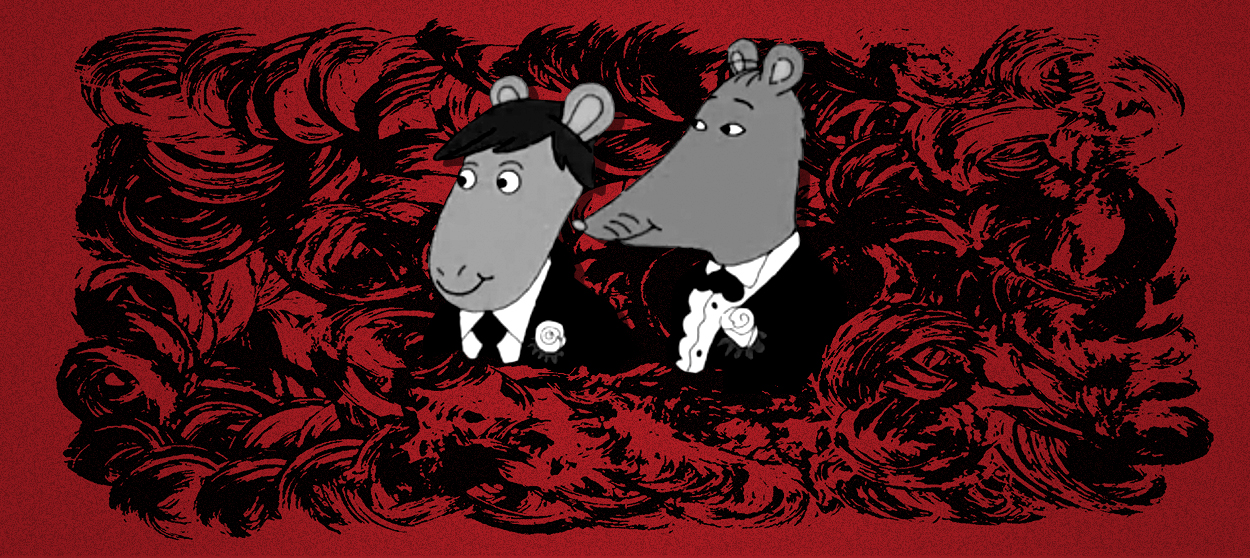Censoring gay marriage on TV could be an ominous sign of things to come
It's a sign of the growing backlash to LGBTQ rights in America


A free daily email with the biggest news stories of the day – and the best features from TheWeek.com
You are now subscribed
Your newsletter sign-up was successful
Even with all eyes on Alabama these days, some alarming events there may not be getting the attention they deserve. Earlier this month, Alabama Public Television decided not to run an episode featuring a same-sex marriage on the PBS animated television series, Arthur. In the episode, Arthur and his friends attend the wedding ceremony of their teacher, Mr. Ratburn, and his male partner. "It's a brand new world," one of Arthur's friends proclaims after the happy nuptials.
So it has seemed when it comes to LGBTQ rights in the United States, especially after the Supreme Court's 2015 decision legalizing same-sex marriage nationwide. But this incident in Alabama — and similar developments across the country — suggest the state of gay rights in 2019 may not be all sparkling rainbows. In fact, even as public opinion polls have shown steadily increasing tolerance of homosexuality and support for gay rights, those historic developments cloud what is happening on the ground where a cultural resistance to homosexuality, emboldened by the anti-gay agenda of the Trump presidency, is gaining steam in spots throughout the nation. If that continues, there could be dire consequences for millions of LGBTQ Americans.
Executives at Alabama Public Television defended their decision not to run the Arthur episode, explaining that parents counted on the network to provide programming they could trust their children to watch without their supervision.
The Week
Escape your echo chamber. Get the facts behind the news, plus analysis from multiple perspectives.

Sign up for The Week's Free Newsletters
From our morning news briefing to a weekly Good News Newsletter, get the best of The Week delivered directly to your inbox.
From our morning news briefing to a weekly Good News Newsletter, get the best of The Week delivered directly to your inbox.
For nearly 50 years, anti-gay activists have made similar arguments, justifying their cause as a protection of children. Meanwhile, cultural sensations like Will & Grace and Queer Eye for the Straight Guy helped normalize the LGBTQ community in American households. Accompanied by millions of Americans coming out of the closet in recent decades — a 2017 study, for instance, found that 70 percent of Americans counted a family member or close friend as gay or lesbian — this cultural mainstreaming of homosexuality provided the groundwork for the significant political transformations that followed.
But that doesn't mean the culture war over gay rights has ended. Rather, the success of the gay rights movement has also provoked a powerful backlash, though one that often goes mostly unnoticed until something like, say, the dispute over a gay wedding cake makes its way to the Supreme Court. Although two-thirds of Americans support same-sex marriage, nearly one-third still describe gay or lesbian relations as "morally wrong." That latter camp appears — like Trump's base itself — nearly unwavering in its position.
The resistance to gay rights remains strongest among conservative Christians, and the churches they attend continue to oppose gay rights, some with growing stridency. Despite the seemingly favorable outlook for LGBTQ Americans in recent years, there's a sizable chunk of the country that has declared they won't capitulate to the cultural progress. Instead, they are working to set it back.
In Texas, lawmakers are considering a whole slate of anti-gay legislation, including a bill that would allow any state licensed professionals to deny their services to LGBTQ persons on religious grounds. Other states, including South Dakota, Oklahoma, and Tennessee, to name just a few, have already passed or will vote on aggressive anti-gay bills, most under the guise of protecting "religious freedom." Those laws would join a dense patchwork of state anti-gay legislation already in place. More than 30 states, for example, still allow so-called "conversion therapy," a treatment system often imposed on LGBTQ minors in an attempt to change their sexual orientation or gender identity. Twenty-eight states, according to the organization Freedom for All Americans, still permit discrimination of LGBTQ Americans in employment, housing, and public accommodations.
A free daily email with the biggest news stories of the day – and the best features from TheWeek.com
Where the anti-gay agenda at the state level ends, the Trump administration's efforts begin. During the 2016 campaign, Trump told LGBTQ Americans, "I will fight for you." As president, he has done just the opposite, often going out of his way to reverse or undermine protections. Transgender Americans have suffered the most. Just this week, the Trump administration announced it would allow homeless shelters to bar transgender persons from their premises. And on Friday, Trump's Department of Health and Human Services proposed a new rule that would eliminate protections for transgender people seeking health care. It has already overturned certain protections for transgender prisoners while also enacting a ban on incoming transgender soldiers to the military. Most of these rights the Trump administration is stripping were only recently established under the Obama presidency, further underscoring the fragility of progress.
Many Americans are likely unaware of this concerted and mounting attack on LGBTQ rights. Indeed, they may assume the contrary. A decreasing number believe that LGBTQ Americans face significant discrimination in this country. In a couple of recent surveys, about half of Americans indicated that the fight for gay rights is no longer even necessary. Ironically, the hard-won victory of same-sex marriage has made the movement for LGBTQ equality seem complete for many Americans. Yet a majority of LGBTQ people continue to report experiencing discrimination or harassment, and research shows anti-gay hate crimes are on the rise.
That's why decisions like the one by Alabama Public Television to not broadcast the Arthur gay marriage episode matter so much. Blocking the cultural inclusion of LGBTQ Americans only bolsters the more insidious political attacks on gay rights.
With the Supreme Court announcing last month that it will hear three cases concerning LGBTQ anti-discrimination, the possibility of the court's conservative majority definitively rolling back the gay rights movement several decades looks shockingly possible. If that happens, the question of what Alabama allows on its airwaves won't be the most urgent one. But for now, it could be the clearest signal of what is to come.
Neil J. Young is a historian and the author of We Gather Together: The Religious Right and the Problem of Interfaith Politics. He writes frequently on American politics, culture, and religion for publications including The New York Times, The Atlantic, the Los Angeles Times, HuffPost, Vox, and Politico. He co-hosts the history podcast Past Present.
-
 Quiz of The Week: 14 – 20 February
Quiz of The Week: 14 – 20 FebruaryQuiz Have you been paying attention to The Week’s news?
-
 The Week Unwrapped: Do the Freemasons have too much sway in the police force?
The Week Unwrapped: Do the Freemasons have too much sway in the police force?Podcast Plus, what does the growing popularity of prediction markets mean for the future? And why are UK film and TV workers struggling?
-
 Properties of the week: pretty thatched cottages
Properties of the week: pretty thatched cottagesThe Week Recommends Featuring homes in West Sussex, Dorset and Suffolk
-
 The billionaires’ wealth tax: a catastrophe for California?
The billionaires’ wealth tax: a catastrophe for California?Talking Point Peter Thiel and Larry Page preparing to change state residency
-
 Bari Weiss’ ‘60 Minutes’ scandal is about more than one report
Bari Weiss’ ‘60 Minutes’ scandal is about more than one reportIN THE SPOTLIGHT By blocking an approved segment on a controversial prison holding US deportees in El Salvador, the editor-in-chief of CBS News has become the main story
-
 Has Zohran Mamdani shown the Democrats how to win again?
Has Zohran Mamdani shown the Democrats how to win again?Today’s Big Question New York City mayoral election touted as victory for left-wing populists but moderate centrist wins elsewhere present more complex path for Democratic Party
-
 Millions turn out for anti-Trump ‘No Kings’ rallies
Millions turn out for anti-Trump ‘No Kings’ ralliesSpeed Read An estimated 7 million people participated, 2 million more than at the first ‘No Kings’ protest in June
-
 Ghislaine Maxwell: angling for a Trump pardon
Ghislaine Maxwell: angling for a Trump pardonTalking Point Convicted sex trafficker's testimony could shed new light on president's links to Jeffrey Epstein
-
 The last words and final moments of 40 presidents
The last words and final moments of 40 presidentsThe Explainer Some are eloquent quotes worthy of the holders of the highest office in the nation, and others... aren't
-
 The JFK files: the truth at last?
The JFK files: the truth at last?In The Spotlight More than 64,000 previously classified documents relating the 1963 assassination of John F. Kennedy have been released by the Trump administration
-
 'Seriously, not literally': how should the world take Donald Trump?
'Seriously, not literally': how should the world take Donald Trump?Today's big question White House rhetoric and reality look likely to become increasingly blurred
